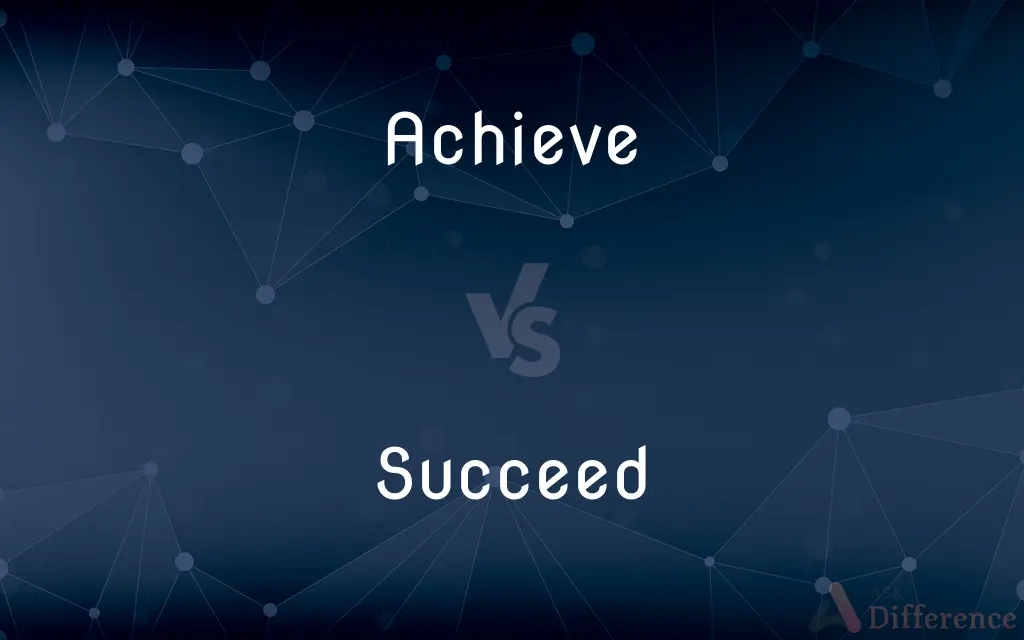Achieve vs. Succeed — What's the Difference?
By Tayyaba Rehman & Fiza Rafique — Updated on April 9, 2024
Achieve focuses on reaching a specific goal through effort, while Succeed emphasizes overall success, often following achievement.

Difference Between Achieve and Succeed
Table of Contents
ADVERTISEMENT
Key Differences
Achieve refers to the accomplishment of a specific goal, target, or task through effort and determination. It implies reaching a defined endpoint or objective. For example, one may achieve a personal milestone, like completing a marathon or earning a degree. Whereas, Succeed goes beyond mere achievement to denote overall success, often in broader terms like career, life, or specific endeavors. Success suggests a favorable outcome or the attainment of one’s aims, possibly as a result of achieving multiple goals.
Achievement often involves completing tasks or reaching goals that are clearly defined and measurable. It’s about hitting specific targets, whether they’re personal, academic, or professional. Achieving something usually means you’ve worked hard, overcome challenges, and reached a milestone you’ve set for yourself. On the other hand, Success encompasses a wider array of outcomes and is more subjective. It’s not just about meeting predefined criteria but also about feeling fulfilled, happy, and accomplished in whatever aspect of life one considers important.
Achievement can be seen in the accomplishment of tasks that contribute to larger goals or missions, often marked by tangible evidence or recognition, such as awards or qualifications. This makes achievements often quantifiable and objective. Conversely, Success is more holistic and can be subjective; it’s often measured by personal satisfaction or the attainment of personal or societal benchmarks of prosperity, which might not always be as tangible or easily quantified as achievements.
While achievement is often celebrated as a moment or milestone, success is typically regarded as a state or condition that results from achieving multiple goals or maintaining consistent performance over time. Achievements are specific points along one’s journey, whereas success is more about the journey itself and the culmination of sustained efforts and achievements.
Achievements are often stepping stones towards success. They represent the completion of tasks or goals that lead to the broader concept of success, which encompasses overall satisfaction with one’s life or career. Therefore, while one can achieve without feeling successful, true success usually involves a series of achievements.
ADVERTISEMENT
Comparison Chart
Definition
Accomplishment of a specific goal or task.
Overall success or favorable outcome.
Focus
Specific targets or milestones.
Broader concept of fulfillment or prosperity.
Measurement
Often quantifiable and objective.
Subjective and holistic, not always quantifiable.
Outcome
Tangible evidence or recognition of completion.
Personal satisfaction or societal benchmarks.
Relationship to Goal
Directly tied to completing tasks or reaching goals.
Encompasses achieving goals and overall contentment.
Compare with Definitions
Achieve
To gain as a result of one’s behavior or action.
Through perseverance, she achieved a significant improvement in her skills.
Succeed
To attain success in a particular activity, field, or role.
She succeeded in her career as a lawyer.
Achieve
To succeed in completing a stage or part of a process.
They achieved the first milestone in the project ahead of schedule.
Succeed
To come next after something in sequence or as a replacement.
The new model succeeds the previous version with improved features.
Achieve
To accomplish something notable that requires hard work and dedication.
He achieved his dream of becoming a doctor.
Succeed
To achieve the desired aim or result.
He succeeded in passing the test after months of study.
Achieve
To obtain a result, especially by specified means.
The team achieved victory through teamwork and strategic planning.
Succeed
To prosper, thrive, or flourish, often after overcoming hardships.
Despite the challenges, the small business succeeded.
Achieve
Successfully bring about or reach (a desired objective or result) by effort, skill, or courage
People striving to achieve
The killings achieved nothing
He achieved his ambition to become a press photographer
Succeed
To follow or ensue as a consequence.
Success succeeded his relentless dedication to the project.
Achieve
To gain with effort or despite difficulty; reach
Achieve fame as a singer.
Achieve a record speed.
Succeed
To come next in time or order
She fell sick, and what succeeded was an outpouring of concern from her fans.
Achieve
To succeed in accomplishing; bring about
Achieve a task.
Achieve an improvement in foreign relations.
Succeed
To replace another in office or position
The prince succeeded to the throne.
Achieve
To accomplish something successfully; perform at a standard or above standard level
Skills needed to achieve in school.
Succeed
To accomplish something desired or intended
"Success is counted sweetest / By those who ne'er succeed" (Emily Dickinson).
Achieve
(intransitive) To succeed in something, now especially in academic performance.
Succeed
(Obsolete) To pass to a person by way of inheritance.
Achieve
(transitive) To carry out successfully; to accomplish.
You can achieve anything if you put your mind to it.
Hannah achieved her lifelong dream of winning a medal at the Olympics.
Succeed
To come after (something) in time or order; follow
Winter succeeds autumn.
Achieve
To conclude, finish, especially successfully.
Succeed
To come after and take the place of
The heir succeeded the king.
Achieve
(transitive) To obtain, or gain (a desired result, objective etc.), as the result of exertion; to succeed in gaining; to win.
Succeed
(transitive) To follow something in sequence or time.
Autumn succeeds summer.
Achieve
To conclude, to turn out.
Succeed
(transitive) To replace or supplant someone in order vis-à-vis an office, position, or title.
The king's eldest son succeeds his father on the throne.
After a contentious election, Jones succeeded Smith as president of the republic.
Take the place of
Achieve
To obtain (a material thing).
Show all the spoils by valiant kings achieved.
Succeed
(intransitive) To come after or follow; to be subsequent or consequent; often with to.
Achieve
To carry on to a final close; to bring out into a perfected state; to accomplish; to perform; - as, to achieve a feat, an exploit, an enterprise.
Supposing faculties and powers to be the same, far more may be achieved in any line by the aid of a capital, invigorating motive than without it.
Succeed
(intransitive) To come in the place of another person, thing, or event; to come next in the usual, natural, or prescribed course of things; to follow; hence, to come next in the possession of anything; often with to.
Following the death of his mother, he succeeded to the throne.
So, if the issue of the elder son succeed before the younger, the crown (or: property) falls to me.
Achieve
To obtain, or gain, as the result of exertion; to succeed in gaining; to win.
Some are born great, some achieve greatness.
Thou hast achieved our liberty.
Show all the spoils by valiant kings achieved.
He hath achieved a maidThat paragons description.
Succeed
(intransitive) To ascend the throne after the removal or death of the occupant.
Princess Buttercup succeeded to the throne as queen after King Willoughby died.
Achieve
To finish; to kill.
Succeed
(intransitive) To prevail in obtaining an intended objective or accomplishment; to prosper as a result or conclusion of a particular effort.
The persecution of any righteous practice has never succeeded in the face of history; in fact, it can expedite the collapse of the persecutory regime.
She succeeded in her efforts to repair the tank.
Achieve
To gain with effort;
She achieved her goal despite setbacks
Succeed
(intransitive) To prosper or attain success and beneficial results in general.
Voted most likely to succeed
Achieve
To reach or attain a desired objective, goal, or standard through effort.
She aimed to achieve a high score on her exam.
Succeed
To turn out, fare, do (well or ill).
Succeed
(transitive) To support; to prosper; to promote or give success to.
Succeed
(intransitive) To descend, as an estate or an heirloom, in the same family; to devolve; often with to.
Succeed
To fall heir to; to inherit.
Succeed
To go down or near with to.
Succeed
To follow in order; to come next after; hence, to take the place of; as, the king's eldest son succeeds his father on the throne; autumn succeeds summer.
As he saw him nigh succeed.
Succeed
To fall heir to; to inherit.
Succeed
To come after; to be subsequent or consequent to; to follow; to pursue.
Destructive effects . . . succeeded the curse.
Succeed
To support; to prosper; to promote.
Succeed my wish and second my design.
Succeed
To come in the place of another person, thing, or event; to come next in the usual, natural, or prescribed course of things; to follow; hence, to come next in the possession of anything; - often with to.
If the father left only daughters, they equally succeeded to him in copartnership.
Enjoy till I returnShort pleasures; for long woes are to succeed!
Succeed
To ascend the throne after the removal the death of the occupant.
No woman shall succeed in Salique land.
Succeed
To descend, as an estate or an heirloom, in the same family; to devolve.
Succeed
To obtain the object desired; to accomplish what is attempted or intended; to have a prosperous issue or termination; to be successful; as, he succeeded in his plans; his plans succeeded.
It is almost impossible for poets to succeed without ambition.
Spenser endeavored it in Shepherd's Kalendar; but neither will it succeed in English.
Succeed
To go under cover.
Will you to the cooler cave succeed!
Succeed
Attain success or reach a desired goal;
The enterprise succeeded
We succeeded in getting tickets to the show
She struggled to overcome her handicap and won
Succeed
Be the successor (of);
Carter followed Ford
Will Charles succeed to the throne?
Common Curiosities
How is success measured compared to achievements?
Success is more subjective and holistic, often measured by personal satisfaction or societal benchmarks, unlike achievements which are more quantifiable.
What is the main difference between achieving and succeeding?
Achieving focuses on meeting specific goals, while succeeding involves overall success and fulfillment.
Is success always the result of achievements?
Success often results from multiple achievements, but it also includes personal satisfaction and fulfillment beyond tangible accomplishments.
Can someone succeed without achieving specific goals?
Success can sometimes be subjective and not directly tied to specific achievements, depending on one's personal or societal benchmarks for success.
Can you achieve without succeeding?
Yes, one can achieve specific targets without feeling successful in a broader sense.
Can achievements be subjective?
Achievements are generally objective and measurable, but the value placed on them can be subjective.
Do achievements guarantee success?
While achievements can contribute to a sense of success, they don’t guarantee overall success, which is broader and more subjective.
Can one be successful in one area of life but not in another?
Yes, one can experience success in certain aspects of life, such as a career, while facing challenges in others, like personal relationships.
How do achievements and success relate to happiness?
Achievements can contribute to happiness by fulfilling goals, while success often encompasses a broader sense of contentment and fulfillment in life.
What role does effort play in achieving and succeeding?
Effort is crucial for both achieving specific goals and attaining overall success, as it drives progress and determination.
Is success the same for everyone?
No, success is subjective and can vary greatly from one person to another, depending on their values, goals, and personal benchmarks.
Are achievements always recognized or rewarded?
Achievements often result in tangible recognition or evidence, but not all achievements are formally recognized.
How do societal views affect one’s perception of success?
Societal benchmarks and values can significantly influence an individual’s perception of what constitutes success.
Can success change over time?
Yes, as individuals grow and their values or life circumstances change, their definition of success can evolve.
Is there a specific path to success?
There’s no one-size-fits-all path to success; it varies based on individual goals, values, and circumstances.
Share Your Discovery

Previous Comparison
Utterance vs. Sentence
Next Comparison
Task vs. AssignmentAuthor Spotlight
Written by
Tayyaba RehmanTayyaba Rehman is a distinguished writer, currently serving as a primary contributor to askdifference.com. As a researcher in semantics and etymology, Tayyaba's passion for the complexity of languages and their distinctions has found a perfect home on the platform. Tayyaba delves into the intricacies of language, distinguishing between commonly confused words and phrases, thereby providing clarity for readers worldwide.
Co-written by
Fiza RafiqueFiza Rafique is a skilled content writer at AskDifference.com, where she meticulously refines and enhances written pieces. Drawing from her vast editorial expertise, Fiza ensures clarity, accuracy, and precision in every article. Passionate about language, she continually seeks to elevate the quality of content for readers worldwide.













































